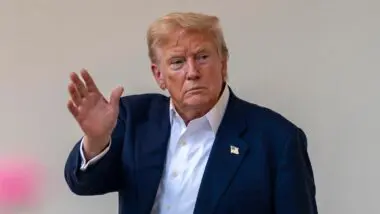The 50% rate decreed by President Donald Trump may not be the only sanction imposed by the United States on Brazil. The country is in danger of embargoing in the coming months if the US Congress takes a law to sanction countries negotiating with Russia, with the imposition of up to 500%rates.
The warning came from the Senators Commission that went to the US to try to negotiate Trump’s tariff. Carlos Viana (Somos-MG), who was part of the entourage, said he heard from Democrats and Republicans who is an American law, not a presidential decree such as the tariff established.
See also:
-
Trump’s tariff affects up to 60% of Brazil’s exports to the USA
“There is another worse crisis that can reach us in 90 days. Both Republicans and Democrats have been firm to say that they will pass a law that will create automatic sanctions for all countries negotiating with Russia,” said Viana, who said “both parties were clear that will pass this law.”
Senator Tereza Cristina (PP-MS), who was Minister of Agriculture in the government of Jair Bolsonaro, commented that the theme was addressed by both American parliamentarians and representatives of the private initiative with whom the entourage dialogue.
“This subject of Russia’s oil and fertilizers buying is a sensitive issue and he has to be in our report when we return to Brazil. They are concerned about ending the war and think that those who buy ammunition for the country to continue having resources for the conflict,” explained the senator.
Brazil imports essential inputs for agribusiness, such as fertilizers, from Russia. Americans claim that this trade ends up favoring the continuity of the Russian war with Ukraine.
Sanctions for buying from Russia predict rates between 100% and 500%
On July 8, Trump threatened to impose 100% secondary rates on any country that negotiates with Russia if there is no agreement to end the war in Ukraine within 50 days.
The secondary rate on the bipartisan project currently under review by the US Congress is much higher: 500% of countries negotiating with Russia.
The proposal is sponsored by senators Richard Blumenthal, Democrat, and Lindsey Graham, republican. Sanctions aim to pressure Russia to meet US demands to end the war.
Government advocates purchase of Russian fertilizers
Senate government leader Jaques Wagner (PT-BA) defended the purchase of Russian fertilizer. “No one does what they want, do what they need. No fertilizer is left out there. So, there’s no way to stop buying, only if it’s to stop the business,” he said.
Regarding the purchase of fuel, Wagner stated that the purchase is not made by the Brazilian government, but by the companies that matter to resell in the domestic market.
See also:
-
US pressure and price climb begin to push Brazilian importers from diesel from Russia
Senator articulates diplomatic exit in the USA
The president of the Senate Foreign Relations Commission (CRE) and the group leader who was negotiating in Washington, Senator Nelsinho Trad (PSD-MS), said the issue should be raised next week at meetings with the competent authorities.
The senator suggested a possible negotiation with American parliamentarians to contain exceptions to countries that justify the purchase of Russian products.
Wagner says negotiations are from government
Jaques Wagner, however, does not agree with this approach, as it understands that this would be a negotiation within the executive or “between governments.” In addition, it argues that negotiations should only be started after law by the US Congress.
“First, it needs to arrive the law, it is not good to comment before it exists. Second, just to reaffirm, Brazilian diplomacy, historically, is a multilateral diplomacy that does not necessarily align with a field A, B, C or D. and this is the proposition, always aiming at peace,” said Wagner.
Wagner acknowledged that this position generates disagreements, including between interlocutors in the United States. “This theme is for debate between governments,” he concluded.


